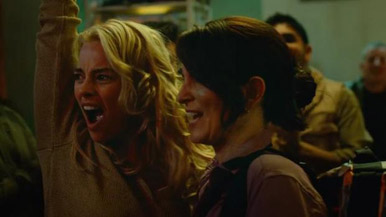Movie Review: Whiskey Tango Foxtrot
By Matthew Huntley
March 8, 2016
BoxOfficeProphets.com

But Whiskey Tango Foxtrot (code for “WTF”) argues this isn’t always (or perhaps even commonly) the case. The film suggests that living in a war zone can be just as boring, uneventful and predictable as living in a peaceful territory, and that people who experience war day in and day out have other things on their mind besides the on-going attacks, bombings and gunfire, which they’ve simply come to accept as normal. And if the current conflict is that inconsequential to the people experiencing it, you can imagine there isn’t much for a war reporter to relay back to her audience.
That’s that lethargic state Kim Baker (Tina Fey) finds herself in after spending three years in Afghanistan and Pakistan. In 2003, she’s working a mundane job as a copy editor for a New York City news organization when her editor calls her and the other “unmarried, childless” employees into a meeting and tells them one of the ways they can keep their jobs is to go to Kabul, Afghanistan and report on the war. To Kim, this isn’t the most tempting of options, but it offers her a much-needed break from the ordinary. And just like that, she calls up her boyfriend (Josh Charles) and tells him she’s headed to Afghanistan.
But shortly after Kim arrives, she’s on the verge of tears because she thinks she’s made a big mistake, grappling with the idea of living the next three months on a United States military base, which has spotty Internet; gawking men who are obsessed with sex; and only a small dorm room Kim can call her own, unless you also count Nic (Stephen Peacocke), her sexy Australian bodyguard, and Fahim (Christopher Abbott), a local Afghan who works as her English-Arabic translator.
Kim’s only female companion is Tanya (Margot Robbie), a buxom British reporter who says that in Afghanistan, Kim is considered a “Nine, on the verge of a 10” as far as her “attractive” level is concerned, whereas in New York she was merely a seven (Kim responds, “So that would make you, what, a 15?!”). Still, Tanya’s report on a recent attack impresses Kim and so she sets out to find a story just as compelling. She rides along with a Marine caravan led by the no-nonsense General Hollanek (Billy Bob Thornton) but the soldiers she interviews, like Specialist Coughlin (Evan Jonigkeit), tell her things that she, not to mention her viewers, likely already knows: the war in Afghanistan has become the “Forgotten War,” with a capital “F” and a capital “W”. It’s taken a back seat to the more popular war in Iraq (remember, this is 2003).
That’s where Kim hopes to make a difference. She’s banking on interviews with Afghanistan’s new Attorney General, Ali Massoud Sadiq (Alfred Molina), and a local warlord (Demosthenes Chrysan), to give her the break she’d need to even justify her being there. And amidst her quest to find a relevant story, Kim begins a romantic relationship with Iain (Martin Freeman), a British photojournalist who seems to have only one thing on his mind before we realize he actually has a sweet side.
Whiskey Tango Foxtrot, based on the memoir, The Taliban Shuffle: Strange Days in Afghanistan and Pakistan, by Kim Barker, is a good movie but not quite a very good one. It’s most effective when it demystifies places presumably as “crazy” and “scary” as Kabul by showing how new outlets only report the most shocking and horrific events that happen there. The result of such reportage is that we, the viewers, are inclined to think such places are always dangerous and that anyone living there must be in constant fear for their lives. “Whiskey” deflates that notion by normalizing Kim’s day-to-day routines, like hearing gunfire in the distance or having Afghans yell at her for not covering her head. The movie challenges not only our preconceived notions about war but also the idea that “war movies” must fit a certain mold with regards to action and tragedy.
When the movie isn’t as interesting is when Robert Carlock’s screenplay resorts to contrived narrative devices to merely drive the plot. Such moments, as when Kim catches her boyfriend doing something sleazy on Skype, or Sadiq making inappropriate proposals, stick out as silly and incredulous. It was these scenes that made me think the movie didn’t have enough confidence in its more insightful themes and couldn’t make up its mind about what kind of story it wanted to tell. A lot of the time, I found myself asking, does it want to be a social commentary, a romantic comedy, or a war drama? It’s possible it can be all three, but it should strive to be honest and original with each genre.
Nevertheless, because Fey is so likable and believable, she keeps the movie grounded and we stay with it. She and Freeman have good chemistry and directors Glenn Ficarra and John Requa allow their relationship to develop naturally. I also appreciated the scenes Kim shares with the head of her news organization (Cherry Jones) about “selling Afghanistan,” as well as Kim and Specialist Coughlin’s final exchange about how we, as people, tend to flatter ourselves into thinking that everything we do has a purpose, and if it doesn’t, we ascribe one to it in order to give our lives meaning.
Perhaps that’s one of the reasons we like to think war is always eventful and exciting, because that somehow makes it more justifiable and meaningful, as if it must and will lead to something better. But in reality, war is simply normal and commonplace in some parts of the world, stuck in a vicious cycle, and at that point, we mistakenly think there’s not a lot left to say about it.